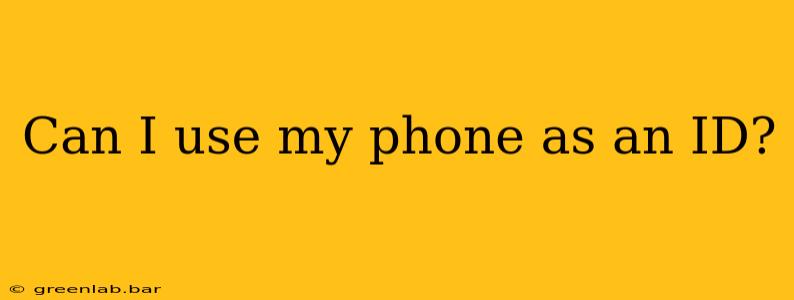The question of whether you can use your phone as an ID is complex, with the answer varying greatly depending on the context. While your phone can store digital representations of your identification, it's crucial to understand the limitations and security implications before relying on it as a primary form of identification.
When Your Phone Might Work as ID
There are specific situations where a digital ID stored on your phone might be accepted:
-
Mobile driver's licenses: Some states and countries are piloting or implementing mobile driver's licenses (mDLs). These are official, government-issued digital versions of your physical driver's license, verified through secure apps. Acceptance varies widely, and you should always check with the specific business or agency to see if they accept mDLs.
-
Digital IDs for specific services: Certain businesses or apps might accept a digital ID stored within their system. This could include loyalty programs, age verification for online purchases, or access to certain buildings or events. Always verify the legitimacy of the service and their security protocols before sharing sensitive information.
-
Airline check-in: Some airlines allow you to use a digital boarding pass stored on your phone, which often requires an associated digital ID for verification purposes. This is not, however, a substitute for a government-issued ID for security checkpoints.
When Your Phone Cannot Replace a Physical ID
In most situations, your phone cannot reliably replace a physical government-issued ID like a passport or driver's license. Here's why:
-
Security vulnerabilities: While digital IDs are improving, they remain vulnerable to hacking, malware, and data breaches. A physical ID is generally much harder to compromise.
-
Lack of universal acceptance: There's no globally accepted standard for digital IDs. What works in one country or with one business may not work elsewhere.
-
Verification challenges: Verifying the authenticity of a digital ID on a phone can be challenging, leading to inconsistencies in acceptance. Physical IDs have established processes for verification.
-
Legal requirements: Many situations, including legal proceedings, banking transactions, and official government interactions, still require physical forms of identification.
Risks Associated with Using Your Phone as ID
Using your phone as a digital ID carries inherent risks:
-
Data breaches: Your personal information is at risk if your phone is lost, stolen, or compromised.
-
Phishing scams: Malicious actors can use phishing techniques to trick you into revealing your digital ID credentials.
-
App vulnerabilities: The security of the app storing your digital ID can impact its overall security.
The Bottom Line: Proceed with Caution
While technology is advancing and digital IDs are becoming more prevalent, it's crucial to proceed with caution. Your phone can be a useful tool for storing some forms of digital identification, but it shouldn't entirely replace physical government-issued IDs in most situations. Always check the specific requirements of the business or agency before relying on your phone as your primary form of identification. Prioritize the security of your phone and be wary of suspicious requests for your digital identification details.

